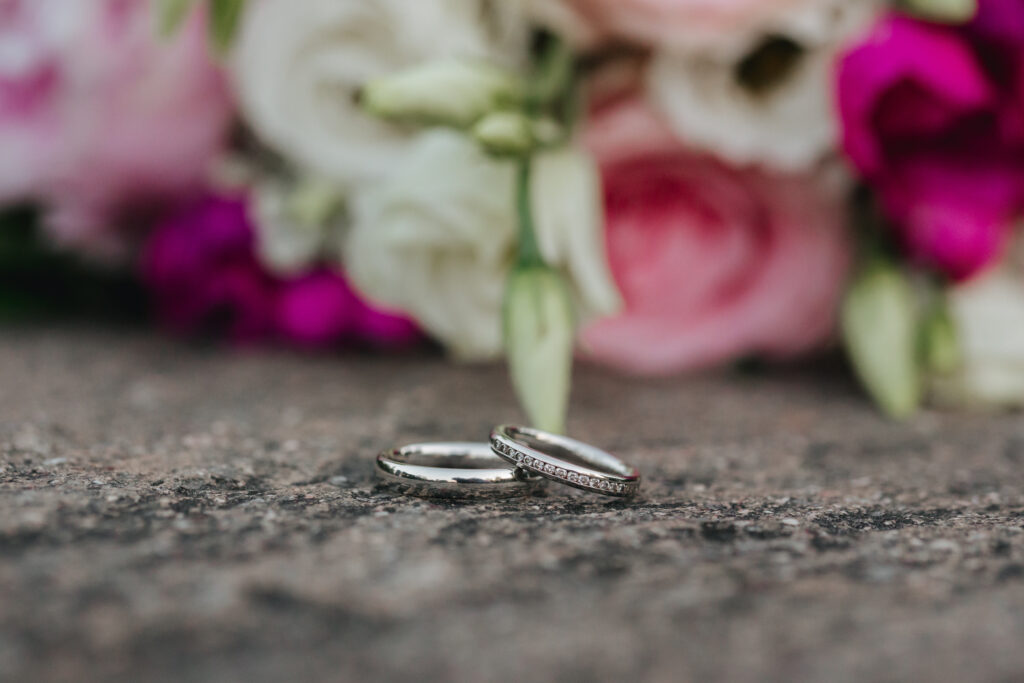A wedding ring is one of the most important and prized possessions you will ever have. That being the case, you definitely want to make sure it stays in the best condition possible.
So with that in mind, which metals for wedding and engagement rings don’t scratch?
Most wedding and engagement rings that do not scratch are made with tungsten, titanium, platinum, palladium, stainless steel, or cobalt, and some are even ceramic. Each of these metals has a high place on the Mohs Scale of Mineral Hardness and will hold up well under any kind of wear and tear.
If you are thinking of aiming higher in the metals category, read on. Below is some info on each of these metals and the pros and cons of each of them.
One of these might be the perfect material for your wedding and/or engagement ring!
Tungsten Wedding and Engagement Rings
Tungsten has been labeled as easily the most scratch-resistant material for wedding rings.
It is dense and heavy, but it will hold up well under pretty much any kind of duress.
It holds a high nine on the Mohs Hardness Scale (MHS) which falls just below the diamond’s ten.
If you are looking for a material that will hold its shape and its finish for pretty much ever, Tungsten is the metal for you.
Pros
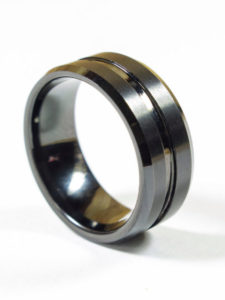
Obviously, there are a few things you should consider before investing, but don’t worry—the pros far outweigh the cons.
For starters, tungsten is fairly reasonably priced.
Most tungsten rings (even some wedding rings) can be bought for $50 or more.
Even the high quality and higher-priced ones are usually only $150-$250.
Tungsten is also hypoallergenic and available in several different colors, making it a good choice with plenty of variety.
In any sort of accident or emergency, tungsten will not bend out of shape, which means it won’t damage your finger either.
While there are not a whole lot of style and design options available for tungsten, it is a very unique metal with a fairly unique look to it.
It is an ideal choice for anyone who wants to steer clear of traditional or common colors such as gold and silver.
Tungsten has a sleek, modern look that many people find extremely appealing.
Cons
If you choose to opt for tungsten, however, you will have to choose one size forever.
It cannot be resized, not only because it is hard and durable, but also because it is a fairly brittle metal.
Any attempt to resize will only result in breakage.
Tungsten is easily one of the more brittle metals on this list, which means it is highly susceptible to chipping or breaking under the right amount of pressure.
If you are worried about cracking or chipping your wedding ring, tungsten might not be the right choice for you.
Tungsten might have a unique look, but it is, in fact, incredibly heavy.
Unlike titanium, which is light and usually comfortable, tungsten is thick and dense.
Honestly, this comes down to a matter of personal preference. Most people do prefer to have a light and comfortable ring on their finger.
This is why titanium is often a much more popular choice.
However, others hate not being able to feel their ring and prefer a heftier piece of jewelry.
If this is the case, tungsten might be perfect for you.
Titanium Wedding and Engagement Rings
Titanium has built up a reputation for itself as being extremely strong but also light and comfortable at the same time.
Sounds pretty awesome, doesn’t it?
Titanium boasts a six on the MHS, clearing gold and aluminum with no problem.
It is 40% lighter than stainless steel, adding to its comfortable and lightweight nature.
Like tungsten, it is scratch-resistant and also fairly reasonably priced.
Pros
As mentioned above, titanium is very lightweight. Not only is it comfortable to wear, but it makes it easy for people who are not used to wearing jewelry to adjust to it.
It exhibits much better scratch resistance than gold, silver, and even platinum.
Like tungsten, it is also hypoallergenic. It is nearly as white as platinum, which makes it very desirable.
Additionally, titanium has high precious metal content, making it fairly valuable.
Cons
Unfortunately, titanium is also extremely difficult to cast, much more so than silver or gold.
Additionally, it is not nearly as white as platinum. For some, this is a difficult thing to overlook because it somewhat ruins the style they’re going for.
Like tungsten, titanium is hard enough that resizing is not ever an option.
If you are planning to invest in a titanium band, you must be willing to settle for one size permanently.
Cobalt Wedding and Engagement Rings
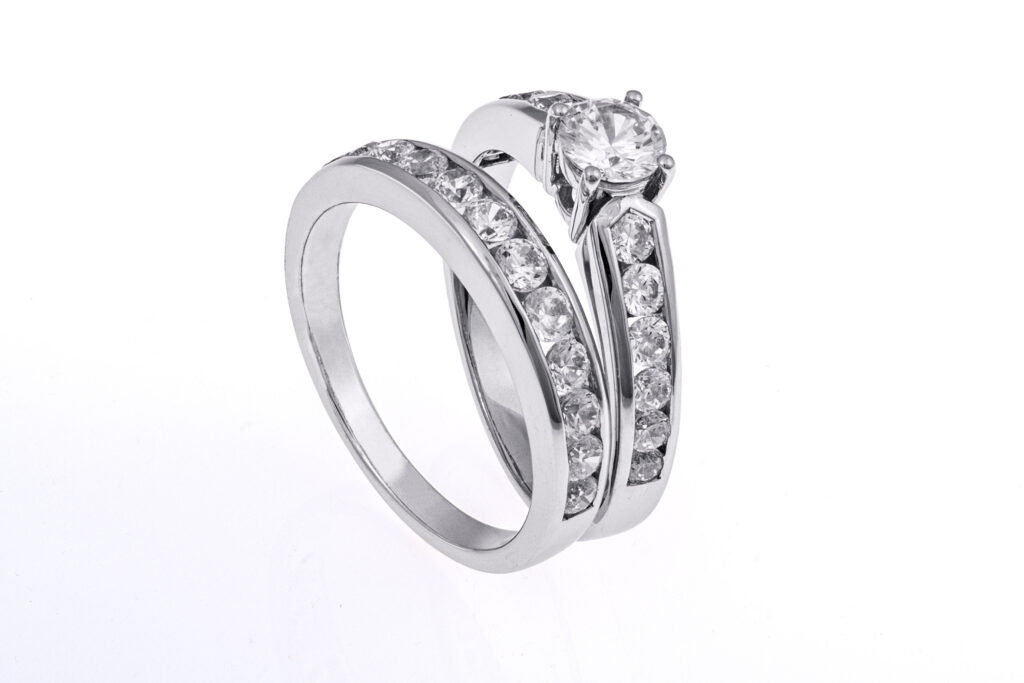
Cobalt is a metal that is steadily growing more and more popular in the wedding and engagement ring market.
Its color is fairly similar to that of white gold, but you will find that is much stronger and much more durable.
With a 5.5 on the hardness scale, cobalt is a little lower than titanium and tungsten, but it can still hold its own.
Because it is often alloyed with other metals, this increases its strength and makes it stronger than it might otherwise be in its natural form.
Pros
As mentioned before, cobalt’s color is pretty popular.
It has a remarkably similar color to white gold without needing rhodium plating.
This feature makes it an extremely desirable material for wedding and engagement rings.
Unlike tungsten, cobalt does not usually crack under pressure and will hold up pretty well under most duress.
Cobalt rings can also be found or styled in colors such as black, yellow, rose gold, and several others (keep in mind, however, that plating could change the ring’s hypoallergenic nature).
In addition to having a pleasant color, cobalt also has an extremely high luster. When polished, it becomes very sleek, reflective, and shiny.
Even better, it has the ability to keep that luster for extended periods of time.
Cobalt is also very durable. It is not susceptible to bending or warping over time, not even under intense pressure.
This makes it twice as resistant to scratching and corrosion.
While cobalt is not nearly as cheap as some other metals, it will be surprisingly easy on your wallet.
While many white gold rings may cost as much as $750 apiece, cobalt rings will only cost $150 but with the same pretty coloring.
Other things such as plating and any other costs inferred might increase the price.
However, cobalt is still cheaper overall and still looks just as good.
Cons
On the downside, cobalt is not that easy to take off. In emergencies especially, it can be bothersome.
You would have to cut the ring off rather than have it removed.
Additionally, as with titanium, cobalt has a limited range of styles available.
Cobalt also has no investment value. Obviously, pawning a wedding ring is not always the first choice for many people, but if times get tough it might be necessary.
Cobalt will do you no favors in that area because it has almost no liquidity or traceable value.
Additionally, engraving is often difficult with cobalt rings.
While this is an excellent sign of durability, it does little to help you with your efforts to add meaning or value to it.
Ceramic Wedding and Engagement Rings
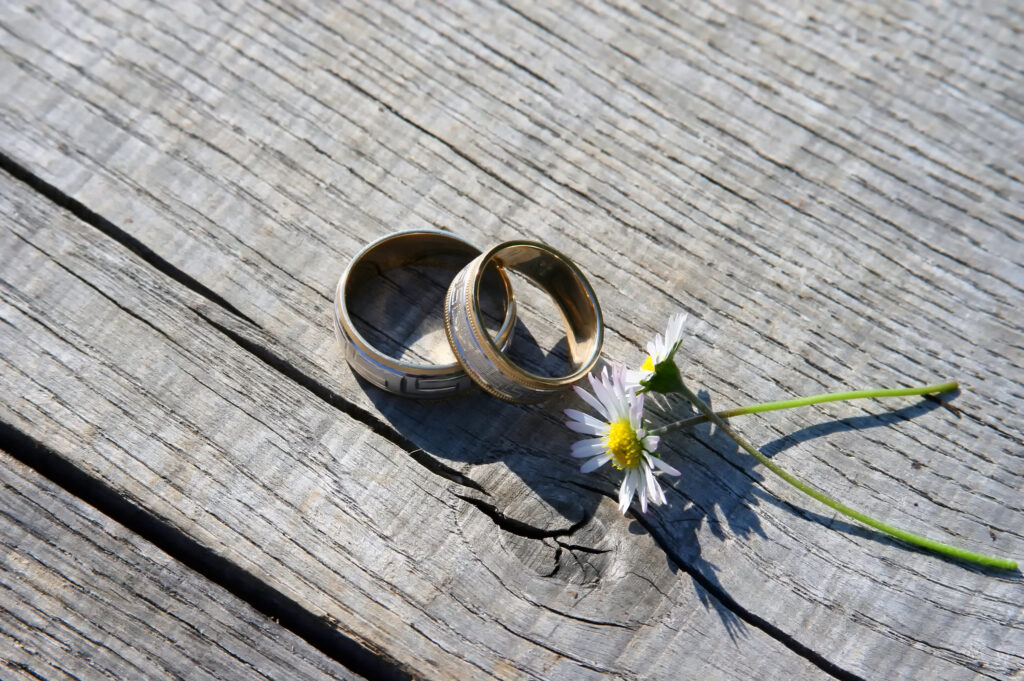
Ceramic is unofficially considered to be a close second to tungsten as far as hardness is concerned.
It is made out of titanium carbide which, like titanium, is an extremely hard yet extremely light metal.
Because it is somewhat newer to the jewelry industry, the style choices are a bit limited, but it does come in multiple different colors.
Unlike black tungsten rings, black ceramic rings have natural black coloration and not plated coloration, which means it will not ever scratch off.
Titanium carbide ranks from a 9 to a 9.5 on the hardness scale, making it pretty tough to beat by any of the others listed here.
Pros
Ceramic is generally viewed as hard, brittle, and easy to break, but in reality, it makes an excellent ring material because of how hard it is to break.
As mentioned before, it ranks above a nine on the hardness scale, which is a sign that you have a pretty durable ring on your hands (pun intended).
It resists scratching pretty well, so if you want something that will stay in top condition for a long time, ceramic is a fairly safe choice.
Ceramic is sometimes a tad more expensive than either titanium or tungsten, but it is cheaper than gold and platinum and still looks nice.
Most ceramic rings can be found for anywhere between $50 and $400. This is a pretty nice range and can accommodate several different kinds of budgets.
Like most of the metals here, ceramic is also hypoallergenic and is completely safe to wear.
This may seem like an odd perk, but ceramic rings are also heat-resistant.
This means they won’t burn your skin in hot water, which also means that if they get washed in hot water, it will be perfectly safe.
Ceramic rings are also non-conductive, so you never have to worry about it shocking you.
This is a particularly nice feature for those who are in the construction or electricity industry because this material will be safe to wear during work hours.
Ceramic is not only durable, but it is also remarkably easy to maintain.
Ceramic rings are scratch-resistant and do not accumulate grime. Unlike most metal rings, they do not require polishing or relating at any time.
All you ever have to do is give it a good, thorough washing with soap and water every once in a while, and it will stay looking as good as new!
Additionally, ceramic is often a good choice for those who have a desire to go off the beaten path.
They are a modern yet somewhat unconventional type of ring. It is perfect for anyone who wants to break tradition.
Cons
Ceramic is durable, but its hardness can sometimes be a downside depending on your point of view.
It is extremely durable, but because it is so hard, there is the possibility that it will fall and break, or at the very least, chip.
This is an undesirable trait for a wedding band. Additionally, its hardness makes it difficult to resize.
This is a common problem with hard metals. Ceramic can be resized, but it is desperately tricky (if not impossible).
Because it is somewhat new, the range of designs for ceramic rings is pretty limited.
This makes it an unfortunate choice for some who wish to be a bit more creative in their ring selections.
Also, if you are concerned about any potential resale value for your ring, you may want to shy away from ceramic.
Again, it is new in the industry, and because of that, there is no telling whether it will be valuable or still in style later on.
If this is something you are worried about, ceramic is probably not the material for you.
Platinum Wedding and Engagement Rings
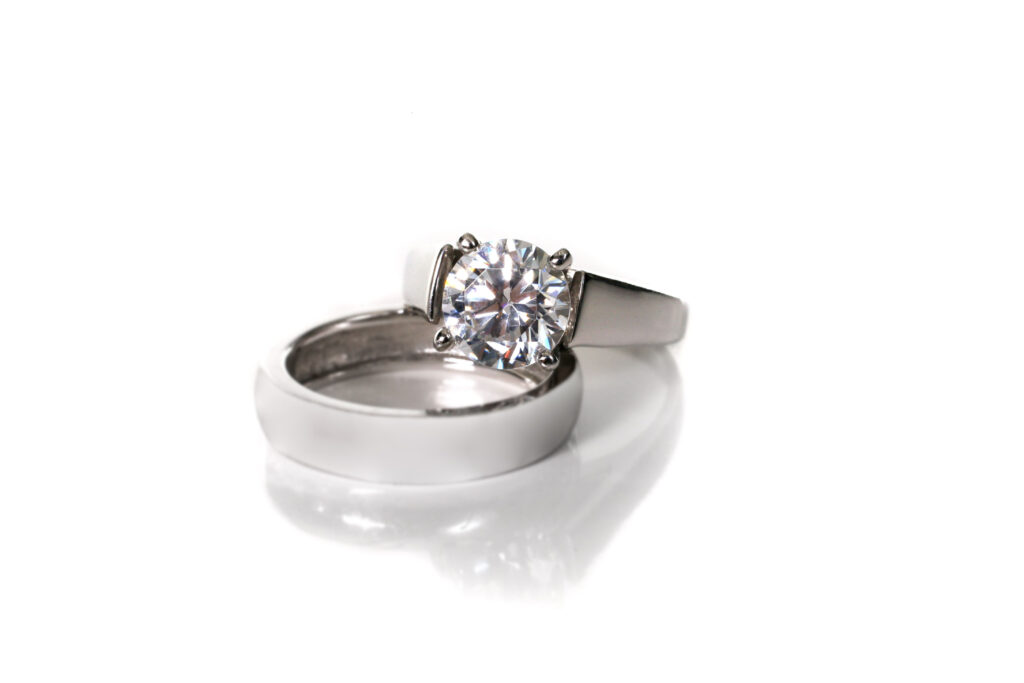
Last but not least we have platinum, which, as you may know, is probably the priciest and most well-known choice on the list.
While platinum is expensive and valuable, it only has a 4-4.5 on the hardness scale.
However, it is still a strong ring choice that can make its own statement.
Because it is a softer metal, it is much easier to work around. It can be engraved and resized with ease while remaining a fairly scratch-resistant metal.
Pros
Platinum greatly enhances the sparkle of a diamond.
It has a pure silver/white color which really helps the diamond to shine as the centerpiece of the ring.
It gives the diamond an extra reflective surface which will increase its brilliance.
Without a doubt, platinum is one of the most eye-catching ring choices out there.
Platinum is very dense, but this also means that it will last a fairly long time.
Gold rings are susceptible to everyday wear and tear, meaning scratches and dents are much more noticeable.
Platinum, on the other hand, has a lovely silver sheen and is much more resistant to scratches and scrapes.
Additionally, like most of the metals here, platinum is hypoallergenic, making it a much easier and much safer choice for most wearers.
Cons
As you may have guessed, the price is platinum’s number one downside.
It is very pretty metal, but it can usually only be bought for several hundred dollars if not more.
Additionally, it is not nearly as hard or as durable as any of the other metals listed here.
At a 4-4.5 on the hardness scale, it can be scratched or dented by anything harder than itself.
For this reason, some choose to opt for a metal that is just a bit tougher.

